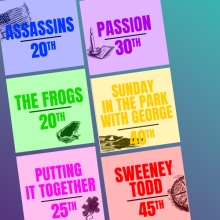On Wednesday, November 27th, the MTI office will close early at 1 PM ET for the Thanksgiving holiday weekend. Office operations will resume on Monday, December 2nd.
Filichia Features: Road Show: The Brothers Musical

Filichia Features: Road Show: The Brothers Musical
The Mizner Brothers weren't anything like The Brothers Rothschild. In The Rothschilds - Bock and Harnick's final musical - Meyer's five sons seldom-if-ever argue among themselves. They have unswervable faith in their father, believe in his plans and carefully work to achieve his goals.
In contrast, Addison Mizner (1872-1933) and Wilson Mizner (1876-1933) rarely agree on anything in Stephen Sondheim and John Weidman's 2008 musical Road Show. The road that the cautious Addison takes is more often than not the high one while the devil-may-care (and downright devilish) Wilson almost always takes the lowest of the low. Many brothers and sisters find that they have the same birth parents in common and little else. Despite the different roads they take in Road Show, the Mizners do have one thing in common: Papa greatly influences them by his deathbed exhortation that "a century's beginning" (as the 20th was then) and that America is more than ever "the land of opportunity."
A new century seems to suggest a clean slate for a fresh start. Just as we often convince ourselves that "age is just a number," the Mizners have to learn that 1900 is, too. They wound up metaphorically searching through haystacks for the needles of opportunities that may not have ever been in them.
They're needled along the way from hearing in the back of their heads Papa's last words: "Make me proud!" Wilson takes his daddy's advice too much to heart. In order to make good, he becomes a minor-league Harold Hill with a gift of gab. He's sure he'll get rich quick but only gets poor quickly - and gets in trouble to boot.
He has the showier role because he's the one who always has a big new idea - or, as Addison will later more accurately brand each of them, a scheme. Yet he's a mesmerizing character who's fun to play. Tony Castellanos enjoyed himself immensely as did the audience at Lyric Stage in Boston's recent production. Neil A. Casey's Addison too gets to display his sense of adventure in business jaunts to Hawaii, India, China and Guatemala (for which Christine Tedesco provided colorful projections). Sheer bad luck plagues Addison, so Casey had to express both resolve and frustration, which he admirably did.
The brothers do go into business together. Wilson insists that Addison come with him to Alaska to pan for gold. "We'll never make our fortune just by sitting on the porch'n looking wistful," he asserts. That's just one of Sondheim's many, many deft-as-usual rhymes. As for wordplay, a jockey who's now incarcerated (thanks to Wilson, of course) mourns "Once I was a pro, but now I'm a con."
Although Wilson is the one to predict the splendors of Alaska while Addison is dubious, soon after they arrive Wilson becomes despondent at the lack of amenities while Addison bravely makes the best of the bad situation.
Weidman does not traffic in one-dimensional characters. The librettist only needs two words to show us that Mama isn't your usual late 19th century sentimental widow. For when Addison defends his position with "If Papa were alive -- " she interrupts him with a curt "He isn't." Vanessa J. Schukis delivered it with a good amount of reality and a lesser dollop of regret.
Weidman can also get in a good joke when he needs it. After Wilson has a heart attack, Addison deadpans "The doctor says he's going to live; I'm getting a second opinion." And if you think that Weidman's running on empty when he has Wilson say the cliché "Be nice to people on your way up because you'll meet them on your way down," you're wrong: Wilson is actually the one who originated the phrase.
In the end, the authors are careful to show that despite everything, these brothers loved each other. That Wilson died a mere 57 days after Addison's death gives credence to the theory that a person dies shortly after the person he or she most loves has passed away.
Sondheim's music is mostly brisk and jaunty, but he's made room for one of the most beautiful melodies: "The Best Thing That Has Ever Happened" is a love song between Addison and a character first introduced as Handsome Man and then later established as Hollis Bessemer. If your most handsome actor is tired of just playing stereotypical roles, he'll get to exercise his acting chops in the scenes where Hollis turns out to be the character with the most integrity. Patrick Varner knew just how to play him. (Splendid casts don't spring up on their own, so here's great credit to co-directors Spiro Veloudos, the troupe's producing artistic director, and Ilyse Robbins.)
In Assassins, Sondheim and Weidman showed that The American Dream could become The American Nightmare. Their Road Show instead shows us The American Bad Dream, where people expect and feel entitled to plenty of rewards.
Charles McNulty's appraisal in The Los Angeles Times - "One of the most compelling chamber musicals I've seen in ages" - is accurate. Lyric Stage only required 11 performers on a unit set. If you've been wanting to do a Sondheim show, Road Show may be just the one.
You may e-mail Peter at pfilichia@aol.com. Check out his weekly column each Monday at www.broadwayselect.com and Tuesday at www.masterworksbroadway.com . His book, The Great Parade: Broadway's Astonishing, Never-To-Be Forgotten 1963-1964 Season is now available at www.amazon.com.

























